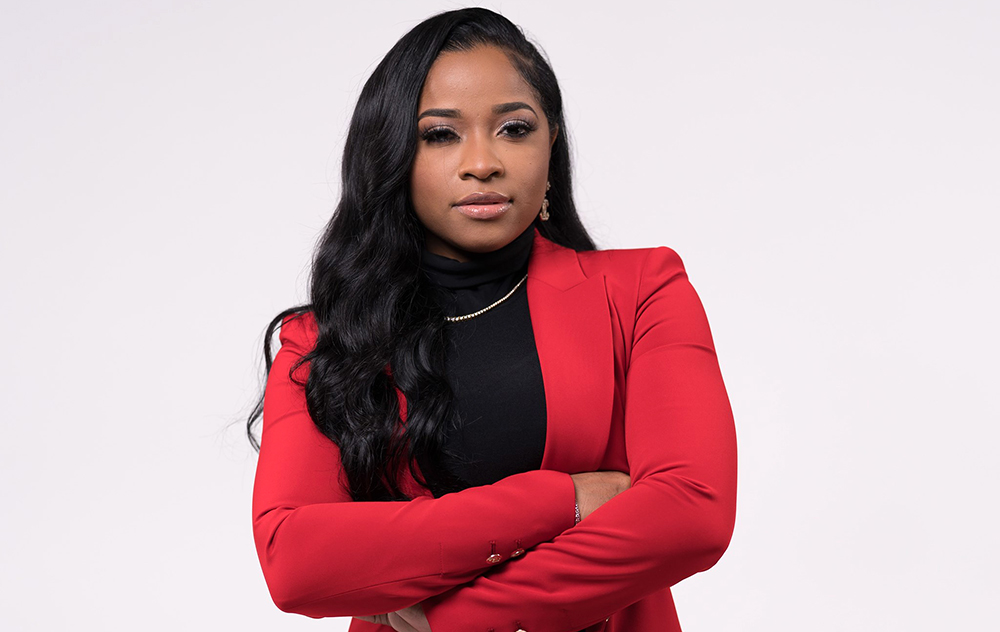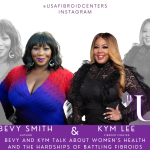
Toya Johnson is an author, rapper, and entrepreneur who launched her own publishing company, Toya Wright Publishing. She is widely known for her reality television appearances in “Tiny and Toya,” “Toya: A Family Affair,” and “Growing Up Hip Hop Atlanta”. Toya’s journey is one many women can relate to because she held off having a myomectomy to have more children.
She still suffers from fibroids today, focusing on a fitness routine and healthy eating to ease her symptoms. Toya wants her work as an ambassador to empower women to be their own advocates when it comes to their health. She shares her story with USA Fibroid Centers in hopes that women will seek solace in and be uplifted by her testimonial.
There Has to Be a Better Way
Toya knew there was something wrong when she began experiencing more severe menstruation symptoms than normal, such as heavy bleeding and painful cramps that often left her immobilized. She complained to her doctor about her symptoms and was diagnosed with fibroids after getting X-ray testing. About 41 percent of women see at least two healthcare providers before diagnosis1, which can add stress and uncertainty to a situation in which the woman is already suffering. Even though the process of her diagnosis was relatively quick, Toya was scared and didn’t know what to expect.
So, she did what many women who receive a fibroid diagnosis would do: she waited to seek treatment. On average, women wait 3.6 years after the initial diagnosis to get treatment2. “I waited because I thought the fibroids would get better on their own, but they got worse,” Toya said. When she went to seek treatment, only hysterectomy and myomectomy were presented to her as options. “I had heard of hysterectomy before,” Toya said. “A few of my family members had gotten one, but they were older, so I was surprised it was being presented to me as an option.” Knowing that she wanted to have more children, Toya opted to have a myomectomy.
However, Toya was warned that even after the myomectomy, her fibroids could come back. She felt that if her fibroids did return, it would inevitably lead to another more serious surgery, which made her upset that there weren’t more and better options for treatment. “I remember thinking to myself, ‘Is there a better way? Because this isn’t it,’” Toya shared. She has partnered with USA Fibroid Centers as an ambassador so women suffering from fibroids can learn from her story and know there’s a better way to treat their fibroids.
Knowledge Is Power
Toya’s decision to get a myomectomy wasn’t just a result of not being presented with all the treatment options available. “I was so tired of bleeding, so tired of being in pain, and so tired of fatigue,” Toya said. “I’d developed anemia because of my fibroids and was eating ice all the time.” The accumulation and severity of her physical symptoms took an emotional toll on her as well. Toya found herself feeling irritable and isolating from social activities because dealing with her symptoms was so exhausting. Even knowing that her fibroids could come back, she chose to undergo a myomectomy to get relief from the physical and emotional effects that her fibroids were causing.
The myomectomy removed 10 fibroids, “from gumball to golf-ball size,” Toya recalled. It was a very painful surgery. She lost four to six weeks of her life for recovery in which she couldn’t work or do things on her own. The recovery time was almost as devastating as her fibroids and her surgery had been, which is another reason Toya is working to raise awareness for non-surgical treatment options, like Uterine Fibroid Embolization (UFE).
“If I had known about UFE, it would have been my first choice. I missed so many opportunities in my career, lost my independence, and dealt with scarring during the recovery from my surgery,” Toya said. Toya’s frustration with her surgery and the resulting recovery process is exacerbated by the fact that her fibroids did return. Even with the surgery and the lifestyle changes she made afterward, Toya is still dealing with two fibroids.
While her symptoms are not as bad as before, she feels like she underwent a painful surgery and difficult recovery for nothing and is speaking up about her experience to transform her feeling of defeat into a message of hope. “I believe the more you know, the more you grow,” Toya said. Having the courage to speak out about her experience, even though it didn’t have an ideal outcome, can give other women the courage to ask questions, seek better options, and take control of their fibroid journey.
Share Your Story to Stop the Suffering
“Sharing our success stories and stories like mine that aren’t as successful will help other women take the first step toward getting better,” Toya said. She admits she was embarrassed to share her story at first. When she finally opened up to her mom and aunt, they shared that each of them had been impacted by fibroids, either personally or through someone they knew. She then had conversations with her friends about fibroids and was surprised by how many of them could relate to her story or knew someone who could.
“It’s very frustrating that fibroids are so ‘hush hush’ when so many women suffer from them,” Toya said. By using her platform as a USA Fibroid Centers ambassador, Toya aims to break the pervasive “hush hush” mentality that keeps women isolated and suffering. Sharing is not just caring, as the saying goes. Sharing our stories is powerful because it brings the fibroid epidemic into our everyday conversations, which is how we can achieve the goal of every woman knowing the most effective treatment options available.
We’re making it easy for women to share their stories and spread hope. Attend our Talk About “U” Instagram Live Series to hear more stories of women like Toya who are using their experiences to make a difference and raise awareness. You can also find other ambassadors’ stories in our blog and read about the recent legislation USA Fibroid Centers is supporting to improve fibroid education and promote research. If you want to have a one-on-one conversation about your fibroid questions, we have a team of dedicated and empathetic fibroid specialists who are passionate about providing the care you need so you don’t have to suffer another day. We know there’s a better way, so talk with us about your options.
1. Erica E. Marsh, Ayman Al-Hendy, Dale Kappus, Alex Galitsky, Elizabeth A. Stewart, and Majid Kerolous. Journal of Women’s Health. Nov 2018. 1359-1367.
2. Ibid.


